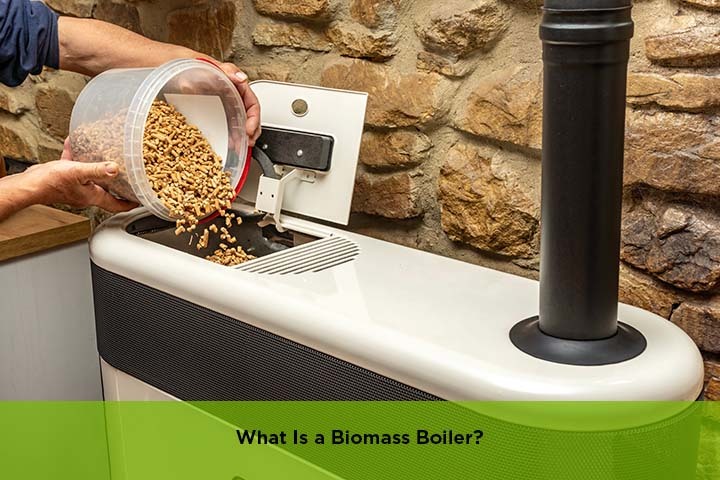Around 150,000 homes in the UK are entirely off the gas grid — and most of them depend on oil or outdated, inefficient boilers. For these people, a biomass boiler is a greener, cheaper alternative. It burns organic matter such as wood pellets or logs to heat your home and supply hot water.
In this guide, we’ll explain exactly how biomass boilers work, their costs, and whether they’re the right option for UK homes in 2025.
What Is a Biomass Boiler?
A biomass boiler is a heating system that warms your home and hot water by incinerating natural, organic material such as wood chips, logs, or wood pellets — not fossil fuels such as oil or gas. It’s basically a traditional boiler but it gets hot from renewable material. That’s making it cleaner and a sensible long-term solution for homes wanting to lower their carbon emissions.
“Biomass” is just a name for fuel made by burning organic matter — wood, essentially. When it is burned, it produces carbon dioxide. But that CO₂ was first absorbed from the atmosphere by the trees as they grew. So, the process is usually considered carbon-neutral.
How Does a Biomass Boiler Work?
A biomass boiler warms your house by burning organic fuel — such as wood pellets or chips — in a burning chamber. Here is the way it works, step by step:
- Fuel Storage: The system contains a storage unit (or hopper) that stores the fuel — pellets, chips, or logs. Some systems have an automated fuel feed, and others must be loaded manually.
- Combustion: The fuel is burnt in a pressurised chamber within the boiler, which creates hot gas.
- Heat Transfer: Those hot gases travel through a heat exchanger, which transfers the heat to water. That hot water travels through your central heating — into radiators, underfloor heating, or your hot water supply.
- Buffer Tank (Optional): Some systems include a thermal store or buffer tank to store leftover heat, so you can call it upon as you need it.
- Flue System: When it is burnt, the boiler emits waste gases (primarily water vapour and CO₂) through a flue or chimney. In city centers, additional filters may be necessary in order to abide by standards of air quality.
Whilst biomass boilers take more room and require to be fuel-stored, they are extremely efficient, environmentally friendly, and easily adaptable with the majority of domestic heating systems.
How Efficient Are Biomass Boilers?
Biomass boilers are extremely efficient — similar to new gas or oil boilers. Indeed, the majority of them have an efficiency rating of more than 90%. And as they utilize renewable fuel (wood, for instance), they’re significantly more environmentally friendly than fossil-fuel systems.
Here are some of the best-rated biomass boilers and their efficiency rating:
| Biomass Boiler | Efficiency |
|---|---|
| Grant Spira | Up to 97% |
| Froling T4 | Up to 95% |
| Viessmann Vitoligno 300-C | Up to 95% |
| Windhager LogWIN Premium | Up to 92% |
And, in addition, the residual ash is a garden fertilizer, so you’re making virtually full use of the fuel — with very little waste. So, not only do you benefit from high efficiency, but you cut your carbon footprint and earn a useful bonus for your plants.
Biomass Boiler Fuel Types
Biomass boilers can run on a few different fuel types. Each has its own pros, cons, and ideal use cases. Here’s a breakdown:
1. Pellet Boilers
Wood pellets are the most popular choice of fuel in contemporary biomass systems. They’re clean, neat, and efficient — often found in automatic boilers.
2. Log Boilers
Logs are the most basic and hands-on type of biomass fuel. They’re cheaper, but you’ll need to load them manually at least once a day. Log boilers are best for rural homes with easy access to wood.
3. Wood Chip Boilers
Wood chips are less efficient and larger than pellets, but more affordable and for warming multi-houses or big buildings.
Biomass Boiler Fuel Types Compared
| Fuel Type | Cost (per tonne) | Energy Output (kWh/tonne) | Efficiency | Best For | Storage Needs |
|---|---|---|---|---|---|
| Wood Pellets | £150–£250 | ~5,000 | 90 to 95% | Small to medium homes | Dry storage; automatic feeding |
| Wood Chips | £60 | ~3,500 | 70 to 80% | Large buildings or groups | Bulk storage; local supply needed |
| Wood Logs | £125 | 2,000–3,000 | 60 to 70% | Rural homes with access to logs | Large, dry space; hand-loaded |
How Much Does a Biomass Boiler Cost?
A biomass boiler in the UK in 2025 will generally cost £6,000 to £18,000 including installation. For a small home, the simplest manually-fed boiler can cost £4,000–£6,000, whereas more sophisticated, automatic pellet-fed systems will cost over £11,500.
That may seem costly alongside a £2,000 gas boiler, but biomass boilers are money savers in the long term.
Best Biomass Boiler UK Costs (2025 Estimate)
| Boiler Type | Fuel Type | Feeding Type | Estimated Cost Range |
|---|---|---|---|
| Small log boiler | Wood logs | Manual | £4,000 – £7,000 |
| Large log boiler | Wood logs | Manual | £7,000 – £10,000 |
| Small pellet boiler | Wood pellets | Automatic | £9,000 – £16,000 |
| Large pellet boiler | Wood pellets | Automatic | £9,000 – £18,000+ |
Biomass Boiler Running Costs UK
Running a biomass boiler in the UK can be surprisingly less expensive than oil, gas, or electricity—if you are utilizing the cheapest fuel and are efficient. Rough breakdown:
Biomass Boiler Cost per kWh
| Fuel Type | Cost per kWh |
|---|---|
| Wood chips | 2.9 p |
| Wood pellets | 4.2 p |
| Gas | ~6.33 p |
| Oil | ~8 p¹ |
| Electricity | ~27 p (per Ofgem cap) |
What this means:
- Wood chips are the cheapest, but are so bulky.
- Wood pellets are easy to use and are suitable for most homes.
- Wood logs are fine if you can acquire wood for pennies.
Annual Biomass Boiler Running Cost Example
For a home that uses 12,000 kWh of heat per year, this is roughly the fuel cost:
- Wood chips: 12,000 × 2.9p = £348
- Wood pellets: 12,000 × 4.2p = £504
- Gas: 12,000 × 6.33p = £760
Biomass Boiler UK Cost Per Month
Operating a biomass boiler in the UK will be £60–£95 per month, based on boiler capacity, which fuel is used, and your heating needs.
- Fuel Price: Wood pellets ~£190/tonne, chips ~£95. Average household consumption is 3–5 tonnes/year.
- Efficiency: Best boilers (such as Grant Spira, Viessmann Vitoligno) are more than 90% efficient— saving fuel and money.
- Maintenance: £200–£500 for annual servicing, or £15–£40 per month.
How Much Does Biomass Boiler Installation Cost?
The price to install a biomass boiler in 2025 can be from £6,000 to £18,000, boiler plus labour, plus any other kit.
What affects the cost?
- Boiler Type: Cheaper are manual log boilers; more expensive are auto pellet systems.
- System Requirements: Larger homes may need new radiators, pipework, or hot water cylinders.
- Labour: Installer fee and complexity can escalate price, especially for custom installations.
Are Biomass Boilers Expensive?
On paper, yes – biomass boilers cost more to install than conventional gas boilers. A simple gas combi boiler could cost you £2,000–£3,000 fitted. In comparison, a biomass boiler setup could be two to three times that amount.
But here’s the bigger picture:
- Fuel is less expensive, particularly if purchased in bulk.
- Long life (25–30 years).
- Grants such as ECO4 Scheme and VAT discounts make it cheaper.
- Fuel prices are fixed, as opposed to gas or oil, which increase annually.
So although the initial cost is high, the long-term savings and reduced emissions usually make it worthwhile.
Pros and Cons of Biomass boiler
The following are the advantages and disadvantages of a biomass boiler:
| Advantages | Disadvantages |
|---|---|
|
|
|
|
|
|
|
|
|
|
|
|
Is a Biomass Boiler Right for You in 2025?
Biomass boilers aren’t suitable for everyone—but they can be a wonderful long-term choice in the right environment. You may want to think about one if:
- You live off the gas grid and at the moment heat your property with oil, LPG, or high-cost electric heaters.
- Your house is large or old and consumes more than 15,000 kWh of heat per annum—that’s a lot of load, which biomass can easily provide.
- You have sufficient room for a pellet store and boiler unit—this might be a garage, outbuilding, or dry indoor space.
- You’re able to qualify for grant funding—there are schemes in England, Wales, or Scotland where they will pay for part of the cost.
- You have stable access to fuel—either from nearby suppliers or your own property, and local planning legislation permits it.
Can I Have Biomass Boiler Grants?
Yes, but this depends on your location and circumstances. In Wales and England, the Boiler Upgrade Scheme (BUS) provides a £5,000 discount on the price of a biomass boiler, provided that:
- Your house isn’t gas-grid connected.
- You reside in a rural area.
- Your house is well-insulated (such as loft and cavity wall).
Is a Biomass Boiler Worth It?
In the right home, yes – it may be worth it. Although the initial price of a biomass boiler might be steep (£18,000 or more), the operating cost can be cheaper than oil, LPG, or electricity.
Throw in the extended lifespan (25+ years), reduced carbon footprint, and local fuel subsidy—and you might see substantial savings over the long term.
Even so, it’s not for all. It might not be suitable for small houses, cityscapes, or areas where there is no space for a fuel storage facility.
FAQs
A biomass boiler in 2025 will cost between £6,000 and £18,000 with installation. Small manually fed models are less expensive, whereas big automatic pellet systems are more expensive.
The primary concerns are the high initial investment, storage space requirement, and hands-on upkeep.
Biomass boilers burn wood pellets, wood chips, or logs. Other organic waste can be burned by some models, but wood-based fuels are the most popular and effective.
Most biomass boilers have a lifespan of 20 to 30 years if maintained well. Servicing and fuel quality contribute significantly to how long it will actually last.
Most biomass systems require a buffer tank (thermal store). It holds the hot water generated by the boiler and keeps heat demand in balance.








